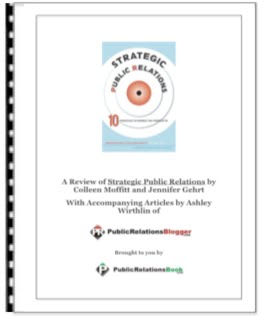________________________________________________________________________
 Crisis management is a vital component of (and perhaps the second half to positive) public relations. As with all aspects of PR, marketing, and advertising, the internet is changing things up, making them easier and more difficult at the same time. Professionals and companies in all industries are now able to conduct their own PR through the new vehicles provided by the internet, like social networking groups, blogs, websites, and press release distribution. In the same sense, consumers/buyers are also able to contribute to the PR surrounding a company through WOM (word of mouth), reviews, etc., making crisis PR more difficult for companies.
Crisis management is a vital component of (and perhaps the second half to positive) public relations. As with all aspects of PR, marketing, and advertising, the internet is changing things up, making them easier and more difficult at the same time. Professionals and companies in all industries are now able to conduct their own PR through the new vehicles provided by the internet, like social networking groups, blogs, websites, and press release distribution. In the same sense, consumers/buyers are also able to contribute to the PR surrounding a company through WOM (word of mouth), reviews, etc., making crisis PR more difficult for companies.
This latter characteristic of PR today means one important thing for companies: a crisis can grow, and fast. There are things that a company can do to help prevent a crisis from growing too out of hand in the first place, though. One example could be creating and maintaining relationships with consumers, so that when a crisis does arise, buyers know and are perhaps advocates for a company. Companies can also try to diffuse the damage of a crisis as it is taking place. With correspondence, action, and taking responsibility, a company can help to halt the spread of negative WOM a crisis can generate.
Though these things may help to prevent a crisis going too far, there are others who say that a crisis is uncontainable online, and will only spread like a wildfire through cyberspace, destroying any good branding in its path. A crisis today means you're done for; people knowing of the crisis means it's already too late to do anything about it. Examples, of course, are BP, Tiger, and Toyota. But those that have come out alive (barely, perhaps), like Toyota and Woods, took action and responsibility for their actions.
BP never fully accepted responsibility; they spread the blame and opted to do nothing for some time. Now, their solutions are simply causing more negative WOM (because of the side-affects of their actions) and are further feeding the flame. More important, though, is the actual damage they've done to others and the environment, not just their own brand or company. This physical damage reflects where their brand is going.
With examples like these that we've seen in the past few years, it's hard to imagine that any company can come out of a crisis, but it really comes down to how they respond. A crisis can most definitely get out of control if the company let's it. Poor response PR makes for a great breeding ground for negative WOM. This can take place on Twitter, Facebook, even things like foursquare, where consumers can share their frustration, distaste, hatred, etc., for a company, and if enough people agree, the idea can spread far and wide. Take for example BP's alter-ego Twitter account; though hilarious and often spot on, it did nothing beneficial for BP's brand or image, and only helped to reiterate the places where they fell short.
It's easy to agree that a crisis today can mean the end of a company. People are so willing to share their bad experiences. Moreover, for a company that continues to carry on with the same actions, crisis PR is pretty futile. In order to be successful with Crisis PR, a company has to see what caused it (monitoring their actions), what's being said about it (monitoring their brand and WOM), what can be done about it (actions to remedy the situation), and finally has to respond, and quickly.
What do you think? Is it too late for a company to recover if the crisis is already known around the internet?
Public Relations Crisis Management | It's All in The Response
________________________________________
 Crisis management is a vital component of (and perhaps the second half to positive) public relations. As with all aspects of PR, marketing, and advertising, the internet is changing things up, making them easier and more difficult at the same time. Professionals and companies in all industries are now able to conduct their own PR through the new vehicles provided by the internet, like social networking groups, blogs, websites, and press release distribution. In the same sense, consumers/buyers are also able to contribute to the PR surrounding a company through WOM (word of mouth), reviews, etc., making crisis PR more difficult for companies.
Crisis management is a vital component of (and perhaps the second half to positive) public relations. As with all aspects of PR, marketing, and advertising, the internet is changing things up, making them easier and more difficult at the same time. Professionals and companies in all industries are now able to conduct their own PR through the new vehicles provided by the internet, like social networking groups, blogs, websites, and press release distribution. In the same sense, consumers/buyers are also able to contribute to the PR surrounding a company through WOM (word of mouth), reviews, etc., making crisis PR more difficult for companies.This latter characteristic of PR today means one important thing for companies: a crisis can grow, and fast. There are things that a company can do to help prevent a crisis from growing too out of hand in the first place, though. One example could be creating and maintaining relationships with consumers, so that when a crisis does arise, buyers know and are perhaps advocates for a company. Companies can also try to diffuse the damage of a crisis as it is taking place. With correspondence, action, and taking responsibility, a company can help to halt the spread of negative WOM a crisis can generate.
Though these things may help to prevent a crisis going too far, there are others who say that a crisis is uncontainable online, and will only spread like a wildfire through cyberspace, destroying any good branding in its path. A crisis today means you're done for; people knowing of the crisis means it's already too late to do anything about it. Examples, of course, are BP, Tiger, and Toyota. But those that have come out alive (barely, perhaps), like Toyota and Woods, took action and responsibility for their actions.
BP never fully accepted responsibility; they spread the blame and opted to do nothing for some time. Now, their solutions are simply causing more negative WOM (because of the side-affects of their actions) and are further feeding the flame. More important, though, is the actual damage they've done to others and the environment, not just their own brand or company. This physical damage reflects where their brand is going.
With examples like these that we've seen in the past few years, it's hard to imagine that any company can come out of a crisis, but it really comes down to how they respond. A crisis can most definitely get out of control if the company let's it. Poor response PR makes for a great breeding ground for negative WOM. This can take place on Twitter, Facebook, even things like foursquare, where consumers can share their frustration, distaste, hatred, etc., for a company, and if enough people agree, the idea can spread far and wide. Take for example BP's alter-ego Twitter account; though hilarious and often spot on, it did nothing beneficial for BP's brand or image, and only helped to reiterate the places where they fell short.
It's easy to agree that a crisis today can mean the end of a company. People are so willing to share their bad experiences. Moreover, for a company that continues to carry on with the same actions, crisis PR is pretty futile. In order to be successful with Crisis PR, a company has to see what caused it (monitoring their actions), what's being said about it (monitoring their brand and WOM), what can be done about it (actions to remedy the situation), and finally has to respond, and quickly.
What do you think? Is it too late for a company to recover if the crisis is already known around the internet?
Popular choices
- Non Gamstop Casino
- Mejores Salas De Póker
- Casino Non Aams
- Non Gamstop Casinos
- Siti Casino Online Non Aams
- Migliori Siti Casino Online
- UK Online Casinos Not On Gamstop
- Meilleur Casino En Ligne Live
- Non Gamstop Casino Sites UK
- Non Gamstop Casino Sites UK
- UK Casino Not On Gamstop
- Casinos Not On Gamstop
- Online Casino
- オンラインカジノ
- UK Casino Not On Gamstop
- UK Casino Not On Gamstop
- Reputable Non Gamstop Casinos
- Casinos Not On Gamstop
- Best Non Gamstop Casinos
- Non Gamstop Casino
- Casinos Not On Gamstop
- Slots Not On Gamstop
- Non Gamstop Casino
- Casino Non Aams
- Casinos Not On Gamstop
- Betting Sites Not On Gamstop
- Casino Online Italia
- Casino En Ligne
- Casino En Ligne Belgique
- Siti Scommesse Bitcoin
- KYC 인증 없는 카지노
- Sites De Paris Sportif Fiables
- Casino En Ligne France
- Casino Non Aams Prelievo Immediato
- Meilleur Casino En Ligne Belgique
- Meilleur Casino En Ligne 2026
- Meilleur Casino En Ligne
- Casino En Ligne 2026
- Casino En Ligne France
Subscribe to:
Post Comments (Atom)






Comments (0)
Post a Comment